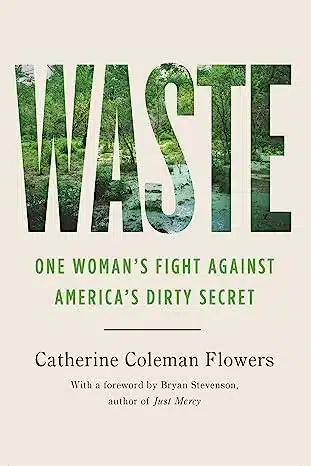Imagine living in a house with plumbing so inadequate that each flush of your toilet sends waste into your backyard. Now imagine you have children and pets who play in that yard.
Tragically, there are families, in the United States, for whom this image is reality.

In Waste: One Woman’s Fight Against America’s Dirty Secret, environmental and social justice advocate Catherine Coleman Flowers’ introduces readers to some of these families. They live in Lowndes County, Alabama, “a place that’s been called ‘Bloody Lowndes’ because of its violent, racist history.’” Nestled between Selma and Montgomery, it was the site of much of the 1965 civil rights march. Today, the county is sparsely populated. Many of its residents live in poverty. And according to Flowers, ninety percent of households have failing or inadequate wastewater systems.
The situation is Third World. Home owners jerry-rig PVC pipes to “drain sewage from houses into cesspools outside.” Raw sewage backs up into homes, “saturating rugs and carpets, whenever it rains—and it rains a lot in Alabama.” “Pools of waste form breeding grounds for parasites and disease.” Hookworm, a tropical parasite, thought to be eradicated in the United States with the advent of indoor plumbing, has returned to Lowndes County. In humans, hookworm can cause fatigue and intestinal disease. In children, it can slow physical and mental development.
Flowers explains that the county’s terrain makes basic sanitation challenging. The land is comprised of dense, nutrient-rich clay soil that retains water. That retention made the area a boon for cotton farmers in the eighteenth and nineteenth centuries. But “what was good for cotton turned out not to be so good for plumbing.” Then there’s a lack of residential infrastructure investment by the state. So, residents face numerous obstacles. They can’t move because they’re homes won’t sell. Engineered septic systems that work with the impermeable soil can cost up to $30,000, a price out-of-reach for most families. And because the state has made the failure to maintain a permitted septic tank a criminal misdemeanor, residents fear arrest and prosecution whenever their systems breakdown.
Of course, Lowndes isn’t the only county in America with a wastewater problem. It’s simply the focus of Flowers’ story because “despite its tortured history,” this is where she was born and where, in the “green pastures and gently rolling hills” she says she still feels her ancestors. But sanitation issues, she writes, plague residents from rural white Kentucky to unincorporated Latinx neighborhoods in California, Native American reservations in the West, and poor inner-city neighborhoods. In the not-so-distant future, climate change, with its rising sea levels and heavy rains, threatens to bring the problem to more homes and not just those in poor communities. She cites one study that found that “64 percent of Miami-Dade County septic systems could malfunction by 2040, threatening water supplies.”
In Waste, Flowers explores the social, structural, and environmental injustices that keep basic sanitation services out of reach for too many Americans. And she recounts her own inspiring story of growing up in Lowndes, leaving for academic and professional opportunities, and coming home an activist, community organizer, and environmental crusader. Throughout the book, Flowers also name drops a who’s who of politicians, movie stars, and billionaires with whom she’s crossed paths, cajoled, and befriended through her work.
Waste will leave readers outraged that something so many of us take for granted—household plumbing—is not accessible to many of our fellow citizens. And they will understand why Flowers calls this lack of basic sanitation “America’s dirty secret.”
——————————————
In May, the U.S. Justice Department announced that an investigation revealed evidence of racial discrimination in association with the sanitation crisis in Lowndes County. Alabama’s Department of Public Health agreed to stop imposing fines on residents with malfunctioning septic systems and to improve access to sanitation infrastructure. You can read the DOJ announcement here.
Jacki Skole is a writer, communications professor, aspiring yogi and dog lover. Dogland: A Journey to the Heart of America’s Dog Problem is her first book.

